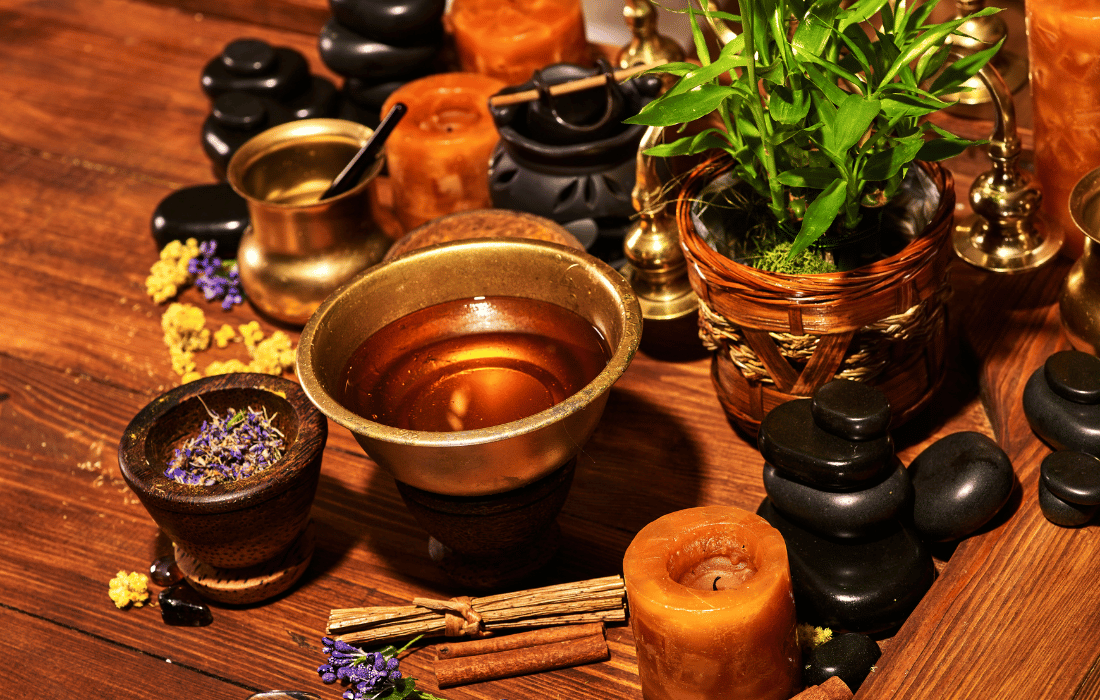In a world where the “ordinary” often involves rushing through life, consuming processed foods, and neglecting self-care, it’s easy to lose sight of our health and well-being. However, what if we could draw from ancient wisdom to restore balance and harmony in our lives? Ayurveda, the traditional system of medicine from India, offers a holistic approach to health that emphasizes balance, natural remedies, and lifestyle practices. While these practices may seem unconventional, they offer a refreshing alternative to the often unhealthy norms of modern life.
Understanding Ayurveda: A Brief Intro

Ayurveda, derived from the Sanskrit words “Ayur” (life) and “Veda” (knowledge), translates to “the science of life.” It is a comprehensive system of health and well-being that has been practiced for over 5,000 years. Unlike Western medicine, which often focuses on treating symptoms, Ayurveda emphasizes preventing illness and promoting health by maintaining balance in the body, mind, and spirit.
Central to Ayurveda is the concept of Doshas, which are the three fundamental energies or principles that govern our physiology and mental state. These Doshas are:
Vata: Composed of air and ether elements, Vata governs movement in the body, including the flow of blood, breath, and nerve impulses. People with a dominant Vata constitution are often creative, energetic, and quick-thinking but may be prone to anxiety and irregular routines.
Pitta: Made up of fire and water elements, Pitta is responsible for metabolism, digestion, and energy production. Those with a Pitta constitution tend to be ambitious, intelligent, and passionate but can also be prone to anger and inflammation.
Kapha: Consisting of earth and water elements, Kapha provides structure and stability in the body. Individuals with a dominant Kapha constitution are usually calm, nurturing, and strong but may struggle with weight gain and lethargy.
Ayurveda aims to balance these Doshas through diet, lifestyle, herbal remedies, and spiritual practices. While this ancient wisdom offers a wealth of knowledge, it’s important to note that I am not an avid Ayurveda practitioner nor an advocate of any single approach. As the legendary Bruce Lee said, “Absorb what is useful, discard what is not, and add what is uniquely your own.” This philosophy reflects my approach to health: I take a little bit from everything—holistic health, modern science (biohacking), Ayurveda, paleo diet, or carnivore diet—and integrate what works best for me.
1. Dinacharya: The Daily Routine
Purpose: Dinacharya refers to the daily routine that aligns your activities with nature’s cycles, promoting physical and mental balance. Ayurveda suggests that following a consistent routine helps regulate the body’s internal clock, improve digestion, and reduce stress.
Practical Tips:
- Morning Rituals: Wake up before sunrise, ideally around 5-6 AM. Start your day with tongue scraping to remove accumulated toxins, followed by oil pulling to promote oral health. Drink a glass of warm water with lemon to stimulate digestion.
- Mindful Eating: Have your meals at regular intervals, with lunch being the largest meal when your digestive fire (Agni) is at its peak. Avoid snacking between meals to give your digestive system a break.
- Evening Wind-Down: Wind down your day with calming activities like reading or meditation. Aim to be in bed by 10 PM to ensure a good night’s sleep.
Why It Matters: Consistency in daily habits helps maintain the body’s natural rhythms, which can enhance overall well-being. Learn more about Dinacharya.
2. Abhyanga: Self-Massage with Oil

Purpose: Abhyanga, or self-massage with warm oil, is a nourishing practice that helps soothe the nervous system, moisturize the skin, and improve circulation. It is particularly beneficial for balancing Vata Dosha, which is prone to dryness and anxiety.
Practical Tips:
- Choosing the Right Oil: Select an oil that complements your Dosha. For Vata types, sesame oil is grounding and warming. Pitta types can benefit from cooling coconut oil, while Kapha types may prefer lighter oils like sunflower oil.
- Application: Warm the oil slightly and massage it over your entire body, using long strokes on the limbs and circular motions on the joints. Allow the oil to soak in for at least 15 minutes before showering.
Why It Matters: Regular Abhyanga can improve skin texture, reduce stress, and support lymphatic drainage, making it a valuable addition to your self-care routine. Discover the benefits of Abhyanga.
3. Nadi Shodhana: Alternate Nostril Breathing
Purpose: Nadi Shodhana, or alternate nostril breathing, is a pranayama technique that helps balance the right and left hemispheres of the brain, calm the nervous system, and improve mental clarity. It’s an effective practice for reducing stress and anxiety.
Practical Tips:
- How to Practice: Sit comfortably with your spine straight. Use your right thumb to close your right nostril and inhale deeply through the left nostril. Close the left nostril with your ring finger and exhale through the right nostril. Then inhale through the right nostril, close it, and exhale through the left. This completes one cycle.
- Duration: Start with 5-10 cycles and gradually increase as you become more comfortable.
Why It Matters: Nadi Shodhana can help clear the mind, balance emotions, and enhance overall mental well-being. It’s a simple yet powerful tool for daily stress management. Explore the benefits of Nadi Shodhana.
4. Herbal Support: Incorporating Ayurvedic Herbs
Purpose: Ayurvedic herbs offer a natural way to support various aspects of  health, from boosting immunity to enhancing mental clarity. Common herbs like Ashwagandha, Turmeric, and Triphala have been used for centuries for their healing properties.
health, from boosting immunity to enhancing mental clarity. Common herbs like Ashwagandha, Turmeric, and Triphala have been used for centuries for their healing properties.
Practical Tips:
- Ashwagandha: Known for its adaptogenic properties, Ashwagandha helps reduce stress and improve energy levels. It can be taken as a capsule or mixed with warm milk before bed.
- Turmeric: A powerful anti-inflammatory, turmeric can be added to meals or consumed as golden milk. It’s particularly beneficial for Pitta types prone to inflammation.
- Triphala: A digestive tonic that supports gut health, Triphala is best taken in powder form mixed with warm water before bed.
Why It Matters: These herbs provide a natural alternative to synthetic supplements and can be integrated into daily life to support holistic health. Learn more about Ayurvedic herbs.
5. Yoga and Movement
Purpose: Physical activity is essential in Ayurveda, with yoga being a favored practice due to its ability to harmonize the body, mind, and spirit. The type of exercise recommended depends on your Dosha.
Practical Tips:
- For Vata: Grounding practices like slow, steady yoga or restorative poses are beneficial. Avoid overly stimulating exercises that can increase anxiety.
- For Pitta: Cooling practices like yin yoga or swimming can help balance Pitta’s fiery nature. Avoid overly competitive activities.
- For Kapha: Invigorating activities like vinyasa yoga or cardio exercises can help counter Kapha’s tendency towards lethargy.
Why It Matters: Regular movement not only improves physical health but also enhances mental clarity and emotional stability. Find the right yoga practice for your dosha.
6. Mindful Eating and Ayurveda
Purpose: Mindful eating is a core Ayurvedic principle that encourages us to eat with awareness and gratitude. It involves choosing foods that are suitable for our unique constitution and the season.
Practical Tips:
- Seasonal Eating: Opt for foods that are in season and locally sourced. This helps align your body with the natural rhythms of nature.
- Listen to Your Body: Eat when you’re hungry, not just because it’s mealtime. Stop eating when you’re comfortably full, not stuffed.
- Use Spices: Incorporate digestive spices like cumin, coriander, and fennel into your meals to enhance digestion and absorption.
Why It Matters: Mindful eating can improve digestion, prevent overeating, and foster a healthier relationship with food. Explore Ayurvedic nutrition.
7. Adequate Sleep and Rest
Purpose: Quality sleep is crucial for maintaining physical and mental health. Ayurveda emphasizes the importance of a regular sleep schedule and creating a restful environment to support restorative sleep.
Practical Tips:
- Bedtime Routine: Establish a calming pre-sleep routine, such as reading a book, taking a warm bath, or practicing gentle yoga stretches.
- Sleep Environment: Keep your bedroom cool, dark, and quiet. Use blackout curtains and a white noise machine if necessary.
- Avoid Stimulants: Limit caffeine and heavy meals in the evening to prevent sleep disturbances.
Why It Matters: Adequate sleep helps regulate hormones, improve cognitive function, and boost immunity. Learn more about Ayurvedic sleep practices.
8. Meditation and Mindfulness
Purpose: Meditation is a cornerstone of Ayurvedic practice, offering a pathway to inner peace, emotional balance, and heightened awareness. It’s a powerful tool for managing stress and cultivating a positive mindset.
Practical Tips:
- Starting Small: Begin with just a few minutes of meditation each day, gradually increasing the duration as you become more comfortable.
- Focus Techniques: Use simple techniques like focusing on your breath, repeating a mantra, or visualizing a peaceful scene.
- Consistency: Try to meditate at the same time each day to build a routine.
Why It Matters: Regular meditation can reduce stress, enhance emotional resilience, and improve overall well-being. Explore different meditation techniques.
9. Connection with Nature
 Purpose: Ayurveda encourages spending time in nature to reconnect with the earth’s natural rhythms and promote a sense of grounding. This practice, known as Prithvi (earth), helps balance all three Doshas.
Purpose: Ayurveda encourages spending time in nature to reconnect with the earth’s natural rhythms and promote a sense of grounding. This practice, known as Prithvi (earth), helps balance all three Doshas.
Practical Tips:
- Nature Walks: Take regular walks in natural settings, whether it’s a park, forest, or beach. Walking barefoot on natural surfaces can further enhance grounding.
- Sun Exposure: Spend time in natural sunlight to boost vitamin D levels and regulate your circadian rhythm. Aim for at least 15 minutes of sun exposure daily.
- Gardening: If possible, engage in gardening or caring for plants. This can be a meditative and rewarding way to connect with nature.
Why It Matters: Being in nature has been shown to reduce stress, improve mood, and enhance overall well-being. Discover the benefits of nature therapy.
10. Detox and Cleanse
Purpose: Ayurveda recommends regular detoxification to eliminate accumulated toxins (ama) from the body. Seasonal detoxes can help reset the digestive system, boost immunity, and restore balance.
Practical Tips:
- Gentle Detox: Start with a gentle cleanse, such as a mono-diet of kitchari (a simple dish made of rice and lentils) or a juice fast. Avoid extreme detoxes that can be harsh on the body.
- Supportive Practices: Incorporate supportive practices like dry brushing, sauna, and herbal teas to enhance detoxification. Dry brushing helps stimulate lymphatic circulation, while saunas promote sweating out toxins.
- Consultation: Before starting any detox program, consult with an Ayurvedic practitioner to ensure it’s appropriate for your body type and current health status.
Why It Matters: Regular detoxification can improve digestion, increase energy levels, and enhance mental clarity. Learn more about Ayurvedic detox practices.
Closing Thoughts
Incorporating Ayurvedic practices into your daily routine may seem out of the ordinary, but in a world where the “ordinary” often involves stress, poor diet, and lack of self-care, perhaps it’s time to rethink what we consider normal. Ayurveda offers a holistic approach to health that emphasizes balance, natural remedies, and lifestyle practices. By adopting these habits, you can cultivate a deeper connection with yourself and the world around you, fostering a sense of well-being that goes beyond physical health.
Remember, the journey to wellness is personal and unique. Whether you’re drawn to the calming effects of meditation, the grounding benefits of nature, or the nourishing qualities of a daily routine, there’s something in Ayurveda for everyone. As Bruce Lee wisely said, “Absorb what is useful, discard what is not, and add what is uniquely your own.” This philosophy is a reminder that we don’t have to adhere strictly to any one system. Instead, we can explore, experiment, and integrate what resonates with us.









